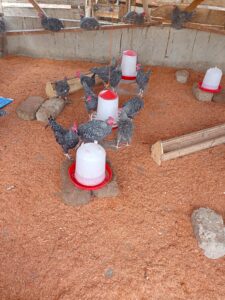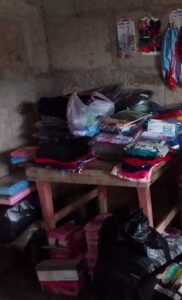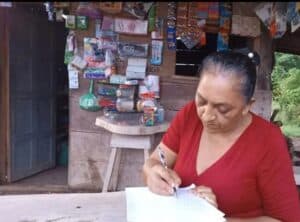Dora Discovers the Merits of Drinking Clean Water

Performing the water test
“My science teacher told me that it’s dangerous to drink water from River Offin. He said that if we consume the water we will fall sick, and possibly die, if left untreated. I don’t understand: my parents and all my siblings drink from Offin, and we have never felt sick,” said Dora, a fifth grade student from Bedabour Primary School. Dora is not alone; many of her friends and peers from rural communities in Ghana shared the same mindset. It is important to educate students about clean water to break this cycle of superstition and misinformation, and improve overall community health.
The Color of Water
At a glance, one can see that the murky water from River Offin is not as clean and clear as the water from the boreholes at Bedabour. However, Dora and her friends used to believe that the color of the water was simply determined by the source, with clear water coming from the ground and murky water flowing from the valley. Many adults in Dora’s community also shared this conviction. Some even believed the color of the river water contained properties that could cure common diseases such as malaria, typhoid, and rheumatism. For others, the river water was simply more convenient to access, so they would use it rather than hauling water from the borehole since they didn’t understand the health benefits of the borehole water. Because of the color difference, they would always haul clear water from boreholes to wash their white clothes to keep them bright, rather than the murky water from the River Offin. They didn’t realize that the color was also an indicator of the quality of the water, and that the murky water was less safe to drink. 
In March, the Teen Girls Club embarked on a campaign to educate over 100 teenage girls from Beposo, Timeabu, and Bedabour about the importance of drinking purified water, how to protect water bodies, and how to protect our environment. They also planted mango, orange, and acacia seedlings to improve the vegetation and nutritional options in their communities.
Though there are many ways of purifying water, we began the training by teaching the girls about boiling and filtering, since both are affordable and sustainable for the families in these communities. Most of the items needed were readily available in the rural communities, with the exception of the filtering materials, which we purchased in the city.
At the start, the girls were invited to hypothesize which source of water would be better to drink. They observed that the water from the borehole was much clearer than the water from the River Offin, but were unsure which was safe and which was dangerous to consume.
 To start the experiment, the girls collected water samples from River Offin and one of the boreholes, boiled both for 30 minutes, and allowed them to cool. The girls eagerly watched as the samples were poured onto their respective filters. Murmurs began to fill the room when the river water filter gathered residue, and the borehole filter did not. At first, some of the girls doubted the source of the residue, for they had been drinking from River Offin for many years unharmed. In order to prove that it was not a false positive and alleviate all doubts, we repeated the process several times, and the girls became convinced that River Offin contained substances that might be risking their health.
To start the experiment, the girls collected water samples from River Offin and one of the boreholes, boiled both for 30 minutes, and allowed them to cool. The girls eagerly watched as the samples were poured onto their respective filters. Murmurs began to fill the room when the river water filter gathered residue, and the borehole filter did not. At first, some of the girls doubted the source of the residue, for they had been drinking from River Offin for many years unharmed. In order to prove that it was not a false positive and alleviate all doubts, we repeated the process several times, and the girls became convinced that River Offin contained substances that might be risking their health.
A Turning Point
Dora was inspired! For the first time in many years, she understood why her teacher always cautioned her against drinking untreated water from River Offin. From that moment, Dora promised not only to stop drinking untreated water, but also to inform her friends and family of the risky practice. With time, future generations will be better off due to the knowledge spread by Dora and the Teen Girls Club.
Moving Forward
Millions of people from developing countries suffer from preventable water borne diseases such as bilharzia, river blindness, and guinea worm infection due to inadequate information and poor water management practices.
It may be difficult to change the minds of the adults in rural Ghana, but gradually we are making advancements in the lives of the teenagers we serve. These communities now have a better understanding of the need to purify water to prevent common water borne diseases and maintain their health.




